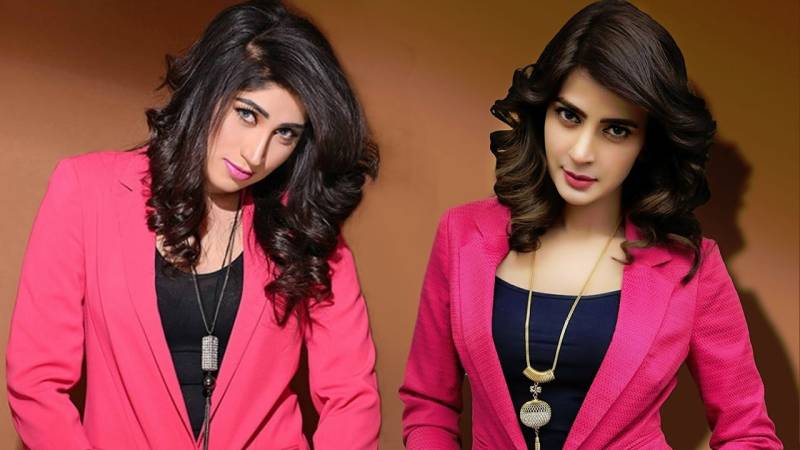Like many, I too am guilty of judging Qandeel Baloch. The truth is, I never bothered to dig deep into the story. I had only seen her videos once or twice and never really realised that there was anything serious. All I knew was that Fouzia Batool, more commonly known as Qandeel suddenly rose to prominence on social media, all due to the random videos she uploaded. I did imagine that people would be commenting inappropriate things under her posts but never realised that the hatred she was receiving was to such an extent.
Without a doubt, the people who casually threw hurls at her where the same people who were enthralled by her videos and always waited for the next one. With increasing number of views, she began to understand what interests our nation the most and made one video after another. We are the ones who gave her all this attention. We are the ones who made her one of the top 10 most searched people on the internet in Pakistan. No wonder, she made a lot of money that was then used to support her family.
It was her death, later followed by the drama serial Baaghi that opened my eyes to the cruel and harsh realities. For those of you who do not know, Baaghi (translation: rebel) is a drama recently aired on Urdu 1. It is a biopic based on Qandeel’s life journey. According to the writer of Baaghi, “hers is a story that screams to be told. A small town, barely-educated girl with ‘grand’ dreams of supporting her family dared to take a step outside her house. Dared. Now she’s a cautionary tale.”
I am certain that many of us never tried to understand if Qandeel was actually the same person off the internet or not. Well, according to the drama, she was a quite normal human being otherwise. From Fouzia’s first marriage where she survived domestic abuse to her job as a bus hostess during which she was harassed and from her disturbed family life to her transformation as a model, the drama will walk you through all of it. It does miss out on the controversy that was created due to a picture of Qandeel and a Maulvi though. I have yet to research about that.
Even then, it was only after watching Baaghi that I came close to understand the circumstances that made Qandeel who she was, before she was killed in the name of “honour” by her own brother. Of course, the idea of an honour killing enraged me since Day 1. However, ever since I have come to know a bit more of her story, it saddens me. Can you imagine your loved ones turning against you? Isn’t it painful?
Baaghi’s last episode is heart-wrenching. Without a doubt, Saba Qamar has done an outstanding job, ensuring that the audience is glued to their screens. You are a really strong person if you were able to see her murder scenes without shedding a tear or two. As she was being asphyxiated by her own dearly brother, the drama showed flashbacks of all the happy-go-lucky moments the two siblings once shared as well as the moments where Munna, Qandeel’s “honourable” brother was taunted because of her “inappropriate videos”.
While no one can obviously understand the excruciating pain Qandeel went through, the flashbacks give us an idea of the disappointment she faced from her family’s side. Imagine breaking your own rules and draining yourself physically as well as mentally, for the sake of people you love, only to get this at the end. I am sorry to say this but I believe that a part of Munna lies in almost every brother out there, no matter if he’s educated or not.
The last episode of Baaghi ends with a few soul-stirring questions that Qandeel left for our society to ponder over. These questions recorded in Saba Qamar’s voice will whiz through your mind like a bullet and ensure that you give them a thought. As Osman Khalid Butt said, the lines were a punch to the gut. Here’s what the lines say:
“Main muashrey key liye kharab thi. Lougoun key ikhlaq key liye khatra thi. Main jaisi bhi thi, aap ki dunya se chali gayi. Apni koi bhi safai paish kiey bagair, mae sirf yae poochna chahti hun key ab toh burayi khatam ho gayi na? Logon ke ikhlaaq bhi bach gaye. Muashra, uss ka kya hua? Muashra theek ho gaya?”
Translation:
“I was a threat to the society and to the character of many people. Whatever I was, I have left your world. Without giving any justifications, I just have one question. The world is pure now, right? People’s characters are saved now, right? And what about the society? Is it all pure now?”
Think!
My point is also not to “glorify” Qandeel. Being a modest person myself, neither did I ever support the path she opted for nor did I ever believe in her as the “epitome of women empowerment”. All I am saying is that if Baaghi is based on a real story then this is not what Qandeel Baloch deserved. This is not the end she deserved, especially when she was very close to a fresh start.






